How Carnival became basketball folklore: On 50 years of the ABBC Tournament
It's not often a word is associated with an entire tournament. But talk to any participant from the last 50 years of the Australian Baptist Basketball Championships, and you’ll soon see why.
Credit: Australian Baptist Basketball Championships
Picture this.
It’s an NBL1 game night and you’re seeing your basketball friends once again at the game weekly and it’s getting towards the last rounds of the season. Someone asks, “Hey, it’s almost January again. Are you coming to Carnival?
“What’s Carnival?”
A couple of NBL1 players are watching their mates play, and chime in.
“You know, the one where this guy hit the game winning bucket to win the championship.”
“Or the one where we sang nursery rhymes as chants to support our team?”
“I remember when we had to grab towels and wipe down each section of the court, as it was too humid while play was happening.”
“I remember watching a player dominate that week then go on to become a WNBL player – hey, wasn’t there also one that revived his NBL career too?”
All of the above are true, and I can tell you from my fifteen years of personal experience, that stories and anecdotes like these have been shared every year in the twelve months between the championships amongst many of our elite in Australia.
So, what exactly is Carnival?
The birth of Carnival
The Australian Baptist Basketball Carnival began in 1971, when Melburnian Reg Mattingley organised a trip to Launceston to enter a tournament run by Northern Tasmanian Baptist Basketball. It sparked the organising of a national event which Mattingley invited every Baptist church in Melbourne —including Doveton, Syndal, Oakleigh, Blackburn and Essendon— to attend, as well as teams from Western Australia and Tasmania.
Credit: Australian Baptist Basketball Championships
In 1972, the first tournament was hosted at the Dandenong Showgrounds in a stable with a floor covered in sheep poo which was swept away prior to play – the irony on many of this from their faith backgrounds was not lost on them. Western Australia won the first Carnival, defeating Carnival legend, Warren Andrews’ Syndal team by two points.
Credit: Australian Baptist Basketball Championships
South Australia joined in 1975, and the four states have had consistent squads take part since the beginning, with appearances from teams hailing from New South Wales, Queensland, New Zealand and the Philippines.
ABBC head Andy Stewart, who many would know as a two-time WNBL Coach of the Year for the Perth Lynx and assistant at the Perth Wildcats in the NBL, says he’s had the privilege to coach and play in many places around the world – but these Carnivals have been his most enjoyable basketball times.
“This event actually defies logic, mostly because it’s a bunch of adults getting together once a year, to play a sport they love, in a fun competitive rivalry, then discussing life challenging topics after cheering themselves hoarse over a B grade game that will have no impact on the relevant finals anyway,” explained Stewart.
Credit: Australian Baptist Basketball Championships
What makes this championship unique is the coming together of basketball’s elite, with district players, social players and even some who’ve never played before. There is a grade for everyone and all are welcome to each year of the tournament.
Traditionally, a week at Carnival looks like a raft of games played daily when looking at the surface. Halfway through the day, a chaplain or speaker would share a life challenging thought, with a skill-based event, three-point and dunk competition featured, and at least a couple of social events at the local reserve or water park thrown in.
Underpinning it all is a spirit of community where participants connect over basketball, life and everyday challenges, no matter what level they play. I’ve been privileged personally to see some the birth of some incredible careers and hear stories of careers past emanating from this tournament, including those who have made it to the NBA and WNBA.
It’s 2015 in Western Australia. I’m watching a superstar guard for Victoria A Women dominate and shoot these outrageously long triples. As the week progresses, we learn she’s an American who’s been playing locally in the NBL1 (SBL at the time of recruitment) for the Rockingham Flames, and was actually filling in for the Victorians. Her name was Sam (pictured right), and during the week she became an instant hit on and off the floor.
Credit: Australian Baptist Basketball Championships
The dominance of her performances saw her lead the scoring and be named MVP for the tournament, also catching the eye of Stewart, who after the championship was named the new head coach for the Perth Lynx. He approached this then little-known sharp-shooter about joining them for the upcoming WNBL season. If you hadn’t guessed by now, that was Sami Whitcomb, who would go on to become a WNBA player with the Seattle Storm and earn selection to the Australian Opals after being naturalised in 2018.
“I had such an incredible time playing Baptist Carnival when it was in Perth that year,” Whitcomb told The Pick and Roll.
“I got to play on a Victorian team that was undermanned, and it was great opportunity to really showcase myself. It was a bit fortuitous that Andy [Stewart] was there and was able to see what I could do – but I’m grateful he was to open the door to that opportunity.
“He really believed in me and backed me in when at the time no other WNBL coach was willing to.”
Whitcomb went on to be picked by the Storm in 2017 after some stellar seasons with the Lynx, including taking them to the championship decider and nearly breaking Perth’s drought in the WNBL in 2015/2016. She would go on to win two championships with the Storm before eventually settling into life in Australia and becoming naturalised. That led to her selection for the Opals, including captaining the side during the 2021 FIBA Asia Cup and 2022 FIBA World Cup Qualifying stage and was a key component of the Opals’ bronze medal win at the FIBA Women’s World Cup in 2022.
Whitcomb is the tip of the iceberg when it comes to the elite that have played and participated in the carnival. The well known Smith family, including Darren (NBL), Jason (Boomers captain) and Alanna (Opals) have all been involved, and nearly half the 1983 NBL side of Launceston Casino City stand out as past participants.
WNBL players Tahlia Kelly (nee Fejo), Myra Donkin, Tenaya Phillips (who played in 2023 for Victoria), Izzy Wright (nee Chilcott) and Brianna Moyes have featured in past championships. They have joined NBL players from Rick Wiley to Todd Fuller (NBA and NBL South Dragons) and Eric Burdon, who relaunched his career after a stint with the Adelaide 36ers with the Wildcats when Stewart was there [a 40-point game standout in the memory of the 2010 Melbourne championship], former 36ers rookie Jordan Dodman and current Illawarra Hawk Daniel Grida.
Of all the players and imports that participated in the championships, there isn’t a story quite like an NBA draft pick that knocked back his NBA career to go do mission work in the Philippines. Tom Randall, a graduate of the Judson University in 1976 was to be the number 11 pick in the 1978 NBA draft (when Larry Bird was picked for the Boston Celtics) for the New Orleans Jazz while he was overseas. NBA records show that James Hardy was eventually drafted. According to the Oklahoman, the decision for Randall to bypass the NBA was an easy one.
Credit: Judson University Athletics
“I just thought why would I go home and go through that when I’ve got a great thing here I loved – plus they already had Pete Maravich [in my potential position]. There was just no way that guy was a legend. You’ve got to be realistic. I don’t think I was being negative,” Randall explained.
I’ve been told by several members of the championship teams, that Randall gave some life changing talks, and it highlights the connection between the elite to the everyday player.
Despite all these incredible players, a championship like this does not happen without key contributors and the Carnival celebrates these now annually in the form of Cliff Cairns, and sadly, the late Warren Andrews.
Cliff and “Wazza”
The championships would not be what they are after 50 years of service without the likes of Cliff Cairns and Warren “Wazza” Andrews.
Cairns was a pioneer for the Tasmania Carnival squad and is remembered for his servant heart leadership. The award is not given out lightly, and after careful consideration is awarded when outstanding service has occurred in a leadership role. Steve O’Brien was the first recipient in 1998 and following him Johanna Crinion, Warren Andrews, Jill Andrews, John Morrhouse, Andy Stewart, Chris Hodge, Jon Dyer, Mark Townsend, Jeff Andrews, Jay Sawyer, Nathan Strempel, Leigh and Megan Pennington, Jess Van Schie and Jonathon Measday.
“Wazza” is that person at every championship, club, tournament that everyone knows, and is one of the very few that has been there since the very beginning in the 1970s. At the presentation dinner of 2023 – The “Spirit of Carnival” award was renamed the Warren Andrews fittingly for the legend of this championships. Like the award, “Wazza” showed outstanding service, kindness and commitment to making the week a great one for all.
The award first given in 2015 has been shared by Karen Lierse, Josh Manthe, Mark Sytsma, Paul Baker, Richard Triplett and in 2023 by his son Jeff Andrews. I have also been privileged to receive it in 2018 and is something I am humbled to have received, considering the incredible amount of support these championships require to run.
Jeff Andrews —son of “Wazza”, who helped compile a history of the championships for their 50-year celebration— shared the qualities that make up his father. “He was a mentor, mate, host, encourager, fun, interested, engaged, a faithful servant, a communicator, a friend and just a flat out nice guy,” Andrews summarised.
The Andrews: Darren, Warren “Wazza”, Jeff, Elijah and Isaiah
“As I grew up, I saw that Carnival was not all about the basketball but about people, something Dad instilled in me. But I had my apprenticeship years. I remember Dad coaching the A team and I felt I wasn’t getting the court time I deserved – and it became all about me.
“When I let him know the star player sat too long on the bench, he listened calmly corrected my poor judgement, firstly pointing out the strengths of other players and secondly about how I should respond.”
“He reminded me that its not all about the basketball…”
Andrews sums up how many feels about the carnival and the impact it’s had on the wider community. “Wazza” played his last Carnival in 2017 in Tasmania, where the whole family got to take the court together. He attended his home championship in Melbourne in 2018 before the COVID hiatus of 2020-2022. Warren Andrews passed away during these years to the grief and sadness of the community. A literal giant of the game everyone knew from these years was gone.
Everything that the Carnival is and will be in the future you can clearly see was epitomised through him.
The future of Carnival
After 50 years of the championships —even in a feature like this— there are way too many stories, anecdotes and tales to tell, which I might even write a book about one day at the end of my career.
Planning for the Launceston 2024 championships is already underway. Not even COVID-19 has been able to halt one of the most unique basketball experiences that anyone who has attended, will no doubt confirm.
There will no doubt be another set of future stars of national and international basketball, first time players, new relationships that will begin and form all through the attending of this one week of basketball annually.
Carnival is no doubt a community of people, with a little faith sprinkled in and mountains of basketball.
And it welcomes everyone of all walks of life, ability and background.
Writer’s note - a special thanks to the ABBC delegates and history team for use of their archives and documented information in putting together this piece for The Pick and Roll.


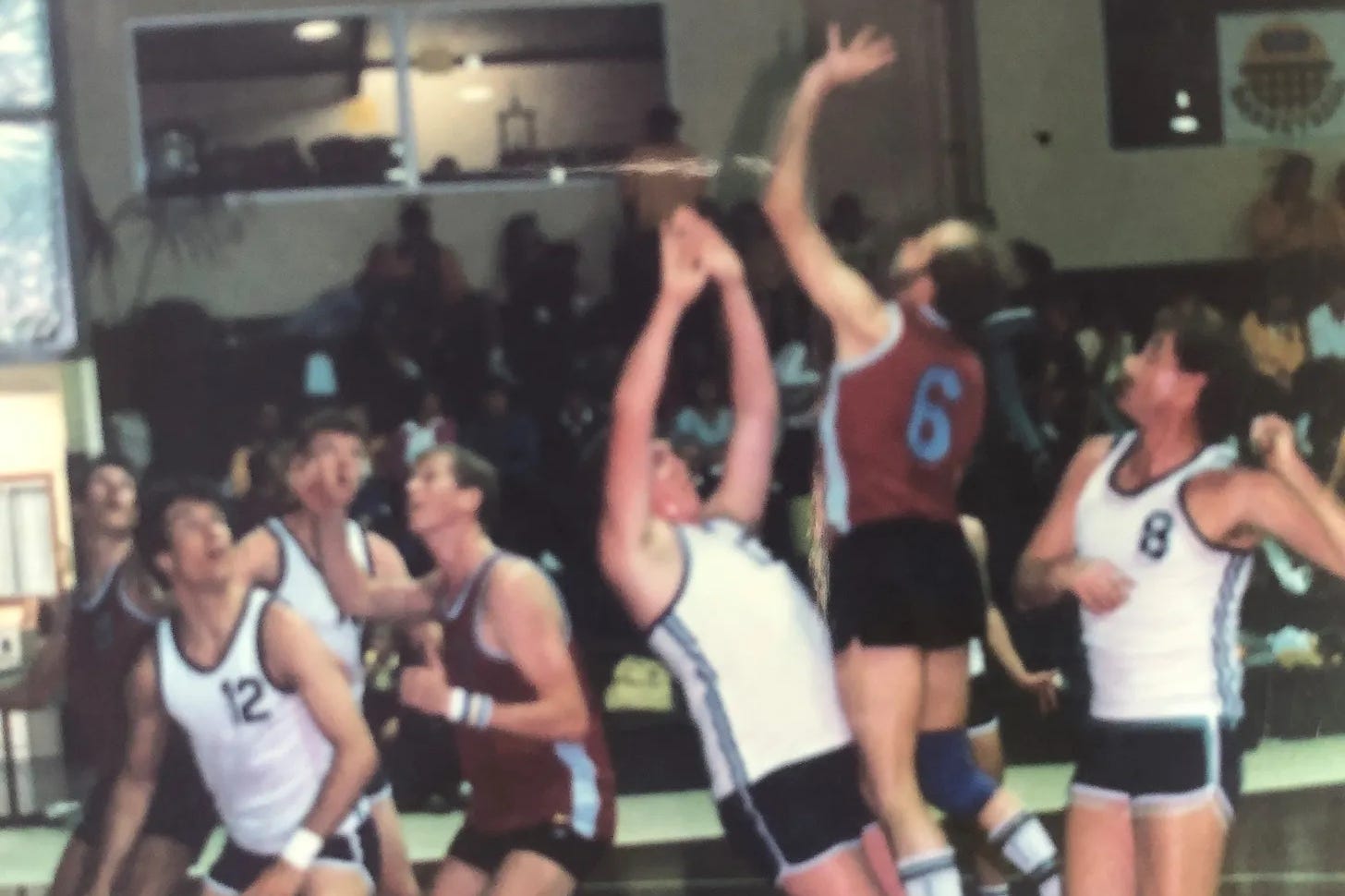
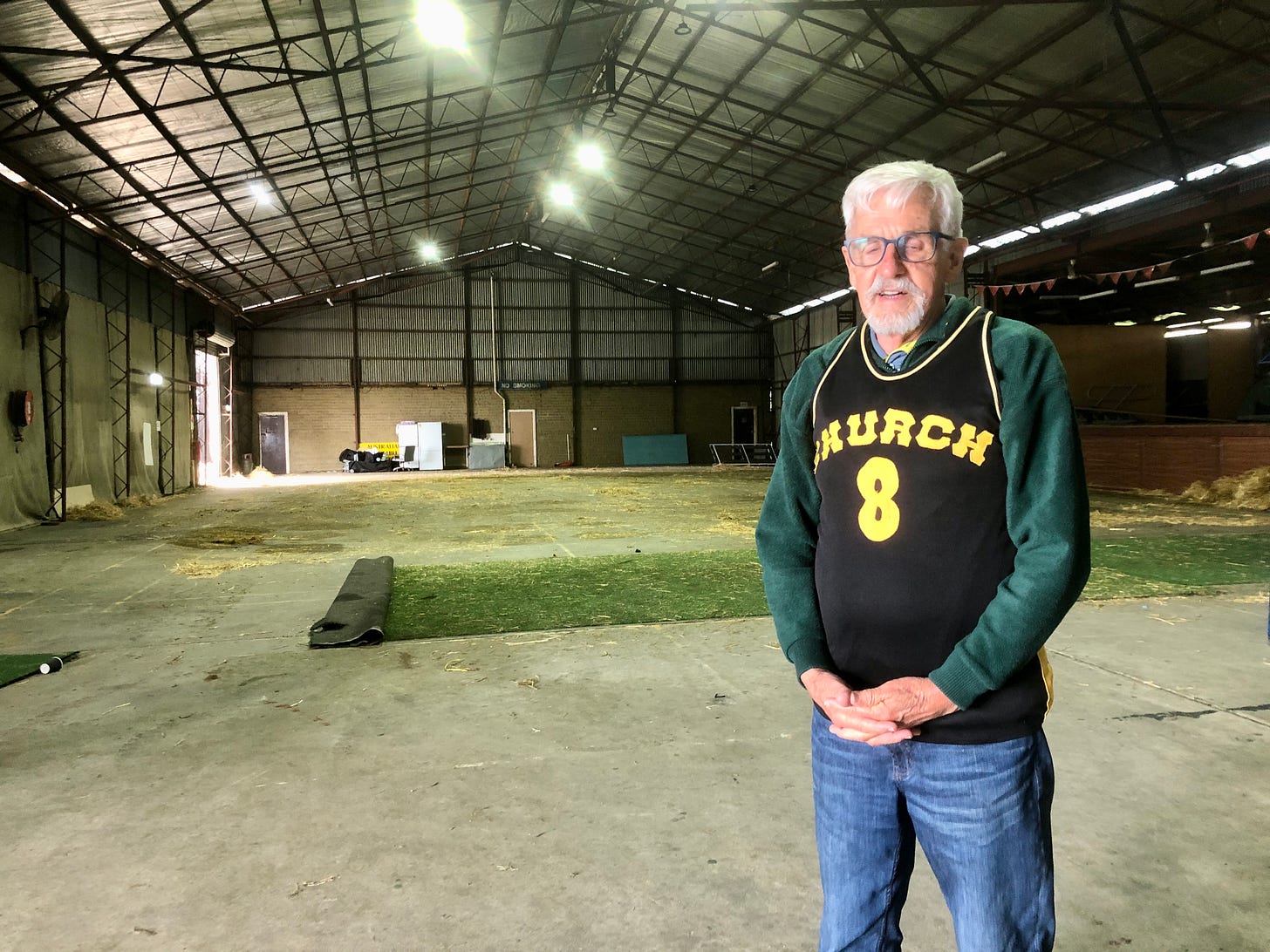
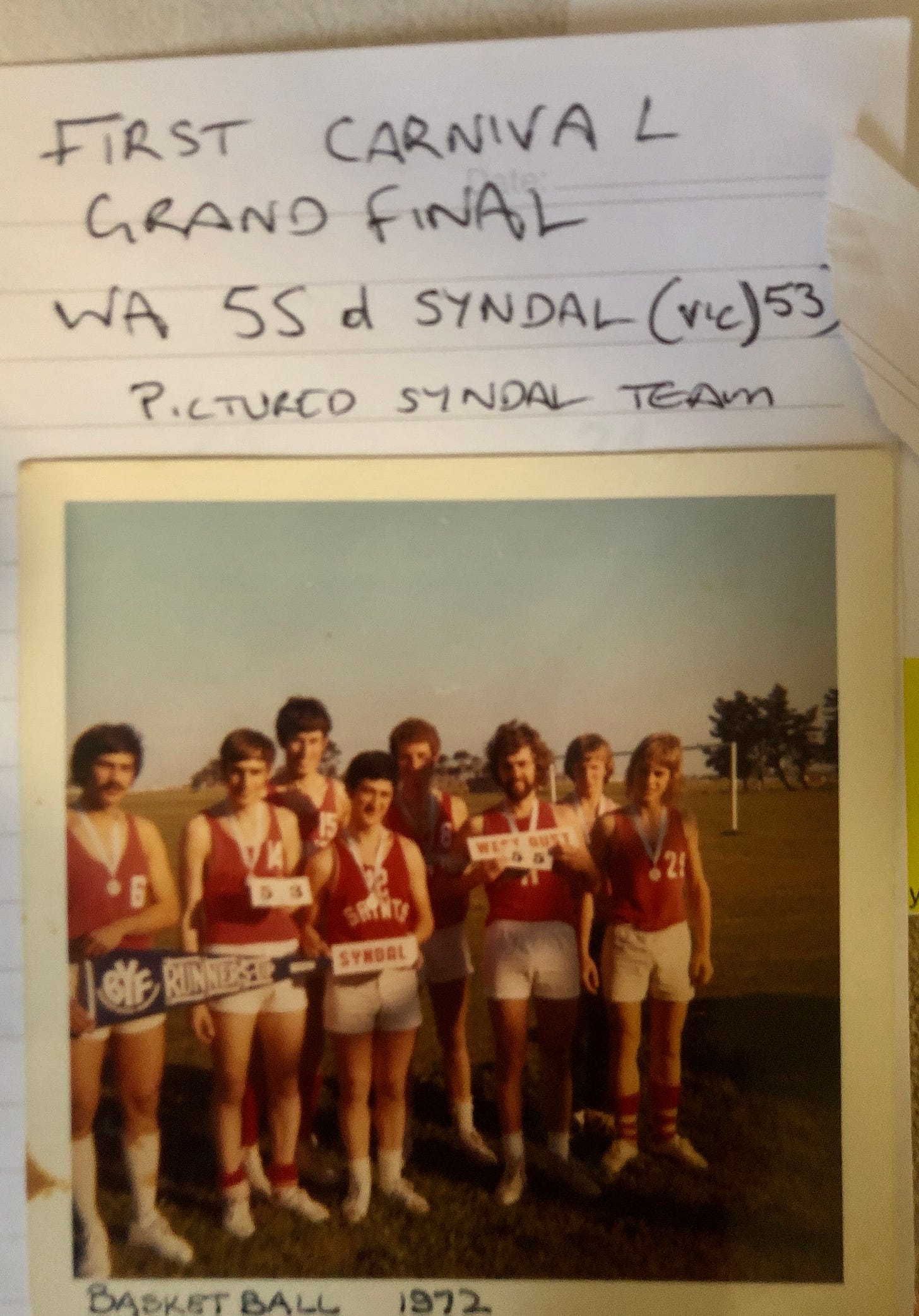
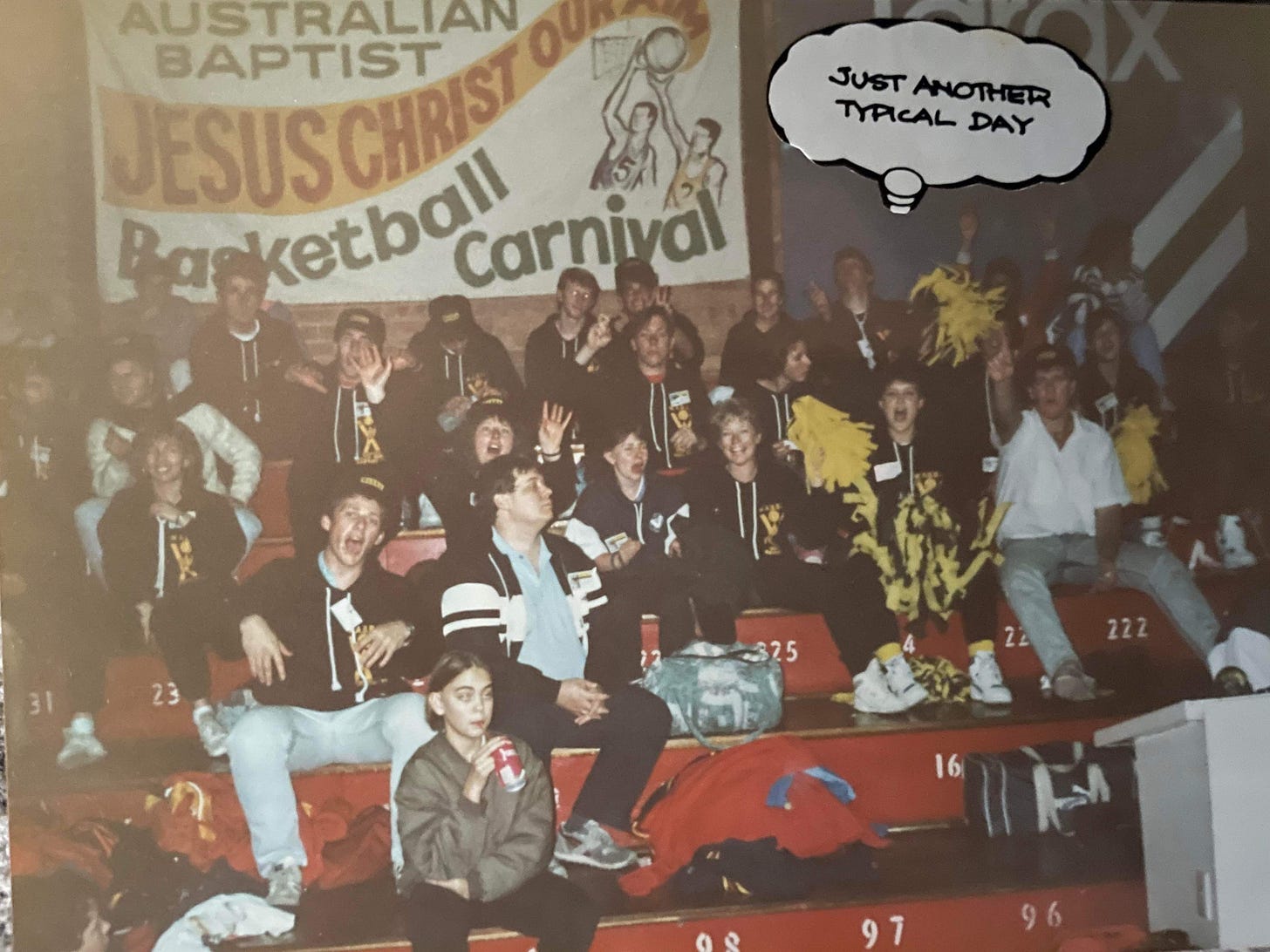




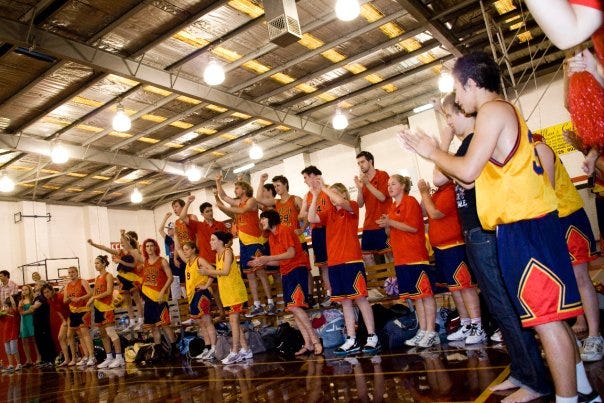
Great article Tristan, yes always thoroughly enjoyed my 3 carnvials attended, the first was 1998 at Nudawading Stadium in VIc where I was a member of the winning WA u/18 team. (And the scene of Andy Stewarts unfortunate ACL injury).
Very easy to get caught up in basketball, your court time and how your playing but like the the great Warran "Wazza" Andrews echoed sentiment to his son "sometimes we need to be reminded thats its not all about basketball", stands very true.